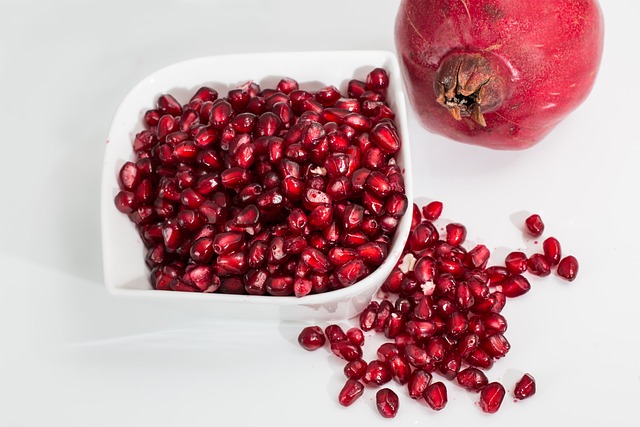Ayurvedic products and herbs
9 Surprising Health Benefits of Pomegranates
Did you know that pomegranates contain powerful antioxidants that have been shown to protect against heart disease, cancer, and other diseases? Learn more about these amazing health benefits of pomegranates in this article.
Delight in the surprising health benefits of pomegranates – the juicy, sugary fruits filled with nutrient-packed edible seeds known as arils. Beyond their vibrant juice, these unique fruits have a plethora of health benefits waiting to be explored.
Pomegranates are a rich source of fiber, vitamins, minerals, and even protein, all while being low in fat and calories. From antioxidant properties to heart and urinary health, along with improved exercise endurance, pomegranates offer a wealth of advantages for your well-being.
Cherished since ancient times for their healing properties, these round red fruits with a delightful balance of sweetness and tartness deliver a remarkable burst of flavor. Discover the top 9 uses of pomegranates as we delve into their immunity-boosting and brain-nourishing potential, making them a must-add to your nutritious diet.
Contents
Pomegranate Nutritional Chart
| Nutrient | Amount | % Daily Value* |
| Serving Size | 1 Each (282 g) | – |
| Calories | 234 | – |
| Total Fat | 3 g | 4% |
| Saturated Fat | 0 g | 0% |
| Trans Fat | 0 g | – |
| Cholesterol | 0 mg | 0% |
| Sodium | 8 mg | 0% |
| Potassium | 0 mg | 0% |
| Total Carbohydrate | 53 g | 19% |
| Dietary Fiber | 11 g | 39% |
| Sugar | 39 g | – |
| Protein | 5 g | 10% |
Top 9 Health Benefits of Pomegranates
1) Pomegranates are packed with nutrients
The arils, or tiny pink seeds inside a pomegranate, are the fruit’s edible portion. Pomegranate seeds benefit your health in many ways. While removing them from the fruit’s inner flesh can be time-consuming, the nutritive value and flavoring are well worth the effort.
Pomegranates are low in fat and calories while being high in fibre, vitamins, and minerals. They are also high in protein.
A half-cup (87-gram) serving of arils contains 72 calories, 16 grams of carbohydrates, 3.5 grams of fiber, 1 gram of fat, and 1.5 grams of protein.
Remember that the nutritional info for pomegranate and arils varies from that of pomegranate juice, which contains little fibre and vitamin C. This holds for fruit in general: eating the whole form provides more fibre.
2) Pomegranates are rich in antioxidants
The health benefits of eating pomegranates are abundant. Compounds called antioxidants help protect your body’s cells from free radical damage. Although free radicals are always present in your body, too many of them can be harmful and contribute to a variety of chronic diseases.
Pomegranates contain antioxidants and polyphenols that protect against this damage. Punicalagins, anthocyanins, and hydrolyzable tannins are the main bioactive compounds found in pomegranates that have antioxidant activity.
3) May help keep inflammation at bay
Inflammation is a normal bodily reaction to infection and injury. Chronic inflammation, on the other hand, can be a problem if left untreated — and it’s common today, particularly in Westernized cultures.
Inflammation, if left untreated, can contribute to a variety of chronic health conditions, including cardiovascular disease, type 2 diabetes, cancer, and Alzheimer’s disease. Pomegranates may help prevent chronic inflammation, which is linked to an increased risk of chronic disease.
This is largely due to compounds known as punicalagin, which have been shown in some studies to have antioxidant and anti-inflammatory properties. Pomegranate juice has been shown to reduce inflammation markers in the body.
4) Pomegranate juice lowers the risk of cancer
Harness the potential cancer-fighting benefits of pomegranates, rich in antioxidants and flavonoids that combat cell damage caused by free radicals.
Research indicates that pomegranates may offer protection against various cancers, including prostate, breast, lung, and colon. Preclinical studies on animals suggest that pomegranate consumption can inhibit tumor growth in the lungs, skin, colon, and prostate.
While more human research is needed, compounds in pomegranate fruit, juice, and oil show promise in killing or slowing cancer cell propagation.
5) Pomegranate benefits heart health
Discover the heart-health benefits of pomegranates, supported by studies showing their ability to lower blood pressure and blood sugar levels. Packed with polyphenol compounds like punicalagins and ellagitannins, these antioxidants prevent artery wall thickening and reduce cholesterol and plaque buildup.
With high levels of anthocyanins and anthoxanthins, pomegranate juice supports good heart health. Research indicates that pomegranate extract fights atherosclerosis by reducing oxidative stress and inflammation.
Promote your cardiovascular well-being by including pomegranates and other polyphenolic-rich fruits in your diet. Enjoy a cup of pomegranate seeds juice daily for potential heart health benefits, as seen in studies.
6) Pomegranate juice benefits urinary health
Pomegranate extract may aid in the prevention of kidney stone formation, owing to its antioxidant activity. Adults ages 18 to 70 who had reoccurring kidney stones were given 1,000 mg of fruit extract for 90 days in one study. This was discovered to aid in the inhibition of the process by which stones form in the body.
Pomegranate extract can also help regulate the levels of oxalates, calcium, and phosphates in the blood, all of which are common components of kidney stones.
7) May improve exercise endurance
Pomegranate polyphenols may improve exercise endurance or the amount of time you can engage in physical activity before becoming tired.
One gram of pomegranate extract taken 30 minutes before having to run increased the time to tiredness by 12%. Pomegranate supplements may help with both exercise perseverance and muscle recovery.
8) Punica granatum benefits your brain
Pomegranates contain antioxidants called ellagitannins, which help to reduce the body’s inflammation. As a result, they provide protection for your brain against conditions influenced by oxidative stress and inflammation.
Ellagitannins may help protect the brain from Alzheimer’s and Parkinson’s disease by reducing oxidative injury and increasing brain cell survival. They may also aid in the recovery of patients suffering from hypoxic-ischemic brain injury.
Pomegranate ellagitannins are thought to aid in the production of urolithin A in the gut, which has been researched for its ability to reduce inflammation within the brain and delay the onset of cognitive diseases.
9) Pomegranate benefits in diabetes control
Early studies suggest that incorporating pomegranate juice into the diet may lead to improved insulin resistance for individuals with type 2 diabetes. Moreover, pomegranates can aid those without diabetes in maintaining a healthy weight.
Buy Pomegranate Plant Online: Buy Now
Conclusion:
Pomegranates are juicy, sugary fruits with edible arils that are closely packed inside. They are high in fibre, vitamins, minerals, and even protein.
They also contain anti-inflammatory and antioxidant compounds such as punicalagins. These have been studied for their cardiovascular, urinary, brain, and prostate health benefits. Pomegranate may also help with workout endurance and muscle recovery, as well as fight off harmful germs.
Despite the lack of human studies on some of these potential benefits, it’s safe to say that pomegranate is a nutritious and tasty addition to your diet. These were the top pomegranate seed’s benefits.
Also Read:
1) Ashwagandha for Height.
2) Health Benefits of Annatto.
3) Health Benefits Of Bay Leaves.
4) Health Benefits of Licorice.
5) Health Benefits of Thyme.
For more details on herbs & remedies related to educational videos subscribe to our channels
https://www.youtube.com/@trustherb
https://www.instagram.com/trustherb.india/


